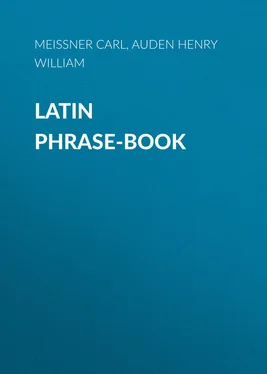Carl Meissner - Latin Phrase-Book
Здесь есть возможность читать онлайн «Carl Meissner - Latin Phrase-Book» — ознакомительный отрывок электронной книги совершенно бесплатно, а после прочтения отрывка купить полную версию. В некоторых случаях можно слушать аудио, скачать через торрент в формате fb2 и присутствует краткое содержание. Жанр: foreign_antique, foreign_prose, на латинском языке. Описание произведения, (предисловие) а так же отзывы посетителей доступны на портале библиотеки ЛибКат.
- Название:Latin Phrase-Book
- Автор:
- Жанр:
- Год:неизвестен
- ISBN:нет данных
- Рейтинг книги:5 / 5. Голосов: 1
-
Избранное:Добавить в избранное
- Отзывы:
-
Ваша оценка:
- 100
- 1
- 2
- 3
- 4
- 5
Latin Phrase-Book: краткое содержание, описание и аннотация
Предлагаем к чтению аннотацию, описание, краткое содержание или предисловие (зависит от того, что написал сам автор книги «Latin Phrase-Book»). Если вы не нашли необходимую информацию о книге — напишите в комментариях, мы постараемся отыскать её.
Latin Phrase-Book — читать онлайн ознакомительный отрывок
Ниже представлен текст книги, разбитый по страницам. Система сохранения места последней прочитанной страницы, позволяет с удобством читать онлайн бесплатно книгу «Latin Phrase-Book», без необходимости каждый раз заново искать на чём Вы остановились. Поставьте закладку, и сможете в любой момент перейти на страницу, на которой закончили чтение.
Интервал:
Закладка:
oculos ( aures, animum 40 40 animum advertere aliquid = animadvertere aliquid = to notice a thing; animadvertere in aliquem = to punish a person.
) advertere ad aliquid – to turn one's eyes (ears, attention) towards an object.
oculi in vultu alicuius habitant – his eyes are always fixed on some one's face.
oculos figere in terra and in terram – to keep one's eyes on the ground.
oculos pascere aliqua re (also simply pasci aliqua re ) – to feast one's eyes with the sight of…
oculos deicere, removere ab aliqua re – to turn one's gaze away from an object.
oculos operire (morienti) 41 41 To shut one's eyes to a thing, conivere in aliqua re .
– to close the eyes of a dying person.
oculorum aciem alicui praestringere (also simply praestringere ) – to dazzle a person.
oculos, lumina amittere – to lose one's sight.
oculis privare aliquem – to deprive a person of his eyes.
luminibus orbare aliquem – to deprive a person of his eyes.
oculis captum esse 42 42 Cf. caecatus, occaecatus cupiditate, stultitia .
( vid. sect. IV. 6., note auribus, oculis… ) – to be blind.
ante oculos aliquid versatur – something presents itself to my vision.
oculis, ante oculos (animo) proponere aliquid – to picture a thing to oneself; to imagine.
ante oculos vestros (not vobis ) res gestas proponite – picture to yourselves the circumstances.
cernere et videre aliquid – to see clearly, distinctly.
oculis mentis videre aliquid – to see with the mind's eye.
in oculis aliquem ferre – to cherish as the apple of one's eye.
aliquis est mihi in oculis – to cherish as the apple of one's eye.
abire ex oculis, e conspectu alicuius – to go out of sight, disappear.
venire in conspectum alicuius – to come in sight.
se in conspectum dare alicui – to show oneself to some one.
fugere alicuius conspectum, aspectum – to keep out of a person's sight.
in conspectu omnium or omnibus inspectantibus – before every one, in the sight of the world.
omnia uno aspectu, conspectu intueri – to take in everything at a glance.
non apparere – to have disappeared.
pedibus obterere, conculcare – to trample under foot.
ad pedes alicuius accidere – to fall at some one's feet.
ad pedes alicuius se proicere, se abicere, procumbere, se prosternere – to throw oneself at some one's feet.
ad pedes alicuius iacēre, stratum esse (stratum iacēre) – to prostrate oneself before a person.
quod ante pedes est or positum est, non videre – to fail to see what lies before one.
sanguine manare, redundare – to drip blood; to be deluged with blood.
vultum fingere – to dissemble, disguise one's feelings.
vultus ficti simulatique – a feigned expression.
vultum componere ad severitatem – to put on a stern air.
vultum non mutare – to keep one's countenance, remain impassive.
IV. Properties of the Human Body
1. Feelings – Sensations – Powers
sensus sani, integri, incorrupti – sound, unimpaired senses.
sensibus praeditum esse – to be endowed with sense.
sensu audiendi carere – not to possess the sense of hearing.
sub sensum or sub oculos, sub aspectum cadere – to come within the sphere of the senses.
sensibus or sub sensus subiectum esse – to come within the sphere of the senses.
sensibus percipi – to be perceptible to the senses.
res sensibus or oculis subiectae (De Fin. 5. 12. 36) – the world of sense, the visible world.
res quas oculis cernimus – the world of sense, the visible world.
res externae – the world of sense, the visible world.
sensus movere (more strongly pellere ) – to make an impression on the senses.
aliquid sensus suaviter afficit – a thing makes a pleasant impression on the senses.
aliquid sensus iucunditate perfundit – a thing makes a pleasant impression on the senses.
pulsu externo, adventicio agitari – to be affected by some external impulse, by external impressions.
sevocare mentem a sensibus (De Nat. D. 3. 8. 21) – to free one's mind from the influences of the senses.
aliquid a sensibus meis abhorret – something offends my instincts, goes against the grain.
vires corporis or merely vires – bodily strength.
vires colligere – to gain strength.
vires aliquem deficiunt – to lose strength.
dum vires suppetunt – as long as one's strength holds out.
bonis esse viribus – to be robust, vigorous.
pro viribus or pro mea parte – as well as I can; to the best of my ability.
pro virili parte 43 43 pro virili parte is distinct from the other expressions, as implying more assurance and confidence on the part of the speaker.
(cf. sect. V. 22.) – as well as I can; to the best of my ability.
2. Birth – Life
in lucem edi – to see the light, come into the world.
ei, propter quos hanc lucem aspeximus – those to whom we owe our being.
tollere 44 44 It was the custom for a Roman father to lift up his new-born child, which was laid on the ground at his feet; hence the expression tollere, suscipere .
or suscipere liberos – to accept as one's own child; to make oneself responsible for its nurture and education.
aliquem in liberorum loco habere – to treat as one's own child.
sexus (not genus ) virilis, muliebris – the male, female sex.
patre, (e) matre natus – son of such and such a father, mother.
Cato Uticensis ortus erat a Catone Censorio – Cato of Utica was a direct descendant of Cato the Censor.
originem ab aliquo trahere, ducere – to trace one's descent from some one.
Romae natus, (a) Roma oriundus – a native of Rome.
cuias es – what country do you come from?
natione, genere Anglus – an Englishman by birth.
ortus ab Anglis or oriundus ex Anglis – a native of England.
urbs patria or simply patria – native place.
animam, spiritum ducere – to breathe, live.
aera spiritu ducere – to breathe the air.
animam continere – to hold one's breath.
cursu exanimari (B.G. 2. 23. 1) – to run till one is out of breath.
spiritum intercludere alicui – to suffocate a person.
in vita esse – to be alive.
vita or hac luce frui – to enjoy the privilege of living; to be alive.
vitam beatam (miseram) degere – to live a happy (unhappy) life.
vitam, aetatem (omnem aetatem, omne aetatis tempus) agere (honeste, ruri, in litteris), degere, traducere – to live (all) one's life (honourably, in the country, as a man of learning).
dum vita suppetit; dum (quoad) vivo – as long as I live.
si vita mihi suppeditat 45 45 suppeditare (1) transitive, to supply sufficiently; (2) intrans. to be present in sufficient quantities = suppetere .
– if I live till then.
Интервал:
Закладка:
Похожие книги на «Latin Phrase-Book»
Представляем Вашему вниманию похожие книги на «Latin Phrase-Book» списком для выбора. Мы отобрали схожую по названию и смыслу литературу в надежде предоставить читателям больше вариантов отыскать новые, интересные, ещё непрочитанные произведения.
Обсуждение, отзывы о книге «Latin Phrase-Book» и просто собственные мнения читателей. Оставьте ваши комментарии, напишите, что Вы думаете о произведении, его смысле или главных героях. Укажите что конкретно понравилось, а что нет, и почему Вы так считаете.

![Рис Хьюз - Madonna Park[e-book - рассказы]](/books/94285/ris-hyuz-madonna-park-e-book-rasskazy-thumb.webp)










